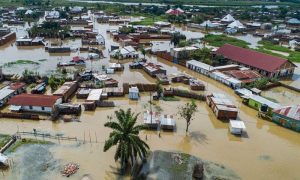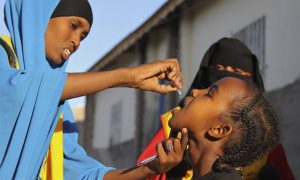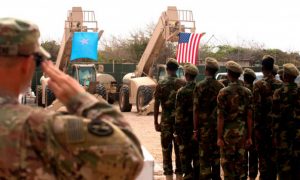
Mogadishu | QOL | August 2, 2017 – Propped up on an iron bed, Hussein laughs and says he always was slim. But he is clearly malnourished. Hussein arrived at Mogadishu’s Banadir Hospital a day earlier with his mother and two sisters, all suffering from acute watery diarrhoea: a tell-tale sign of cholera. A nurse at the hospital told IRIN she believed the whole family got sick from the same water source. This is Somalia’s worst cholera outbreak in five years. So far, 71,663 cases have been counted, including more than 1,098 deaths, according to Doctor Ghulam Popal, the World Health Organization representative. In July, when Hussein was admitted, 5,840 cases of acute watery diarrhoea were reported at Banadir Hospital alone.
Cholera is an acute disease that can kill within hours if left untreated. Waterborne, it thrives in unsanitary conditions. After nearly three decades of continuous conflict, Somalia has a barely existent government with no public health system and 800,000 people driven into unsanitary settlements by drought and insecurity perfect conditions for cholera to thrive. “[The] WASH infrastructure in Somalia is totally collapsed due to the absence of the government,” explained Hassan Ahmed Ali, a Water Sanitation and Hygiene expert with the Norwegian Refugee Council, a development agency.
Unknown scale: The extent of Somalia’s cholera crisis is likely to be a good deal worse than the official numbers suggest. There are no health clinics or hospitals for 400,000 displaced people clumped in settlements along the two main arterial roads that feed into Mogadishu. Ali of the NRC believes many people, not counted in the statistics, will have died before they could reach treatment. Neither are the cases counted in the swathe of territory controlled by the jihadist group Al-Shabaab, which is battling the government.
Compounding the effects of the war, three consecutive seasons of drought have served to tip Somalia into an even deeper food crisis. More than 6.2 million people over half the population – need aid. That vulnerability increases their susceptibility to cholera.
Rules and regulations: “Unless the systems are strengthened, we can only save lives. Long-term social well-being cannot be achieved,” said Mahboob Ahmed Bajwa, the head of WASH for the UN’s children’s agency, UNICEF. “Systems” refers both to the federal government’s loose relationship with the decentralised states, and the country’s generally pitiful infrastructure.
National institutions are weak. In the absence of government, all water supply is privatised and unregulated. These profit-driven companies do not overly concern themselves with cleanliness or quality, despite the obvious risks. Doctor Lul Mohamed, head of paediatrics at Banadir Hospital, points to the problem of open defecation, and to the lack of controls that allows what toilets are available to be built right next to wells.
.
Source: IRIN
Xafiiska Wararka Qaranimo Online | Muqdisho
____________________________________
_____________________________________________________________________________________
Xafiiska Wararka Qaranimo Online | Mogadishu, Somalia
_____________________________________________________________________________________Advertisement
_____________________________________________________________________________________






